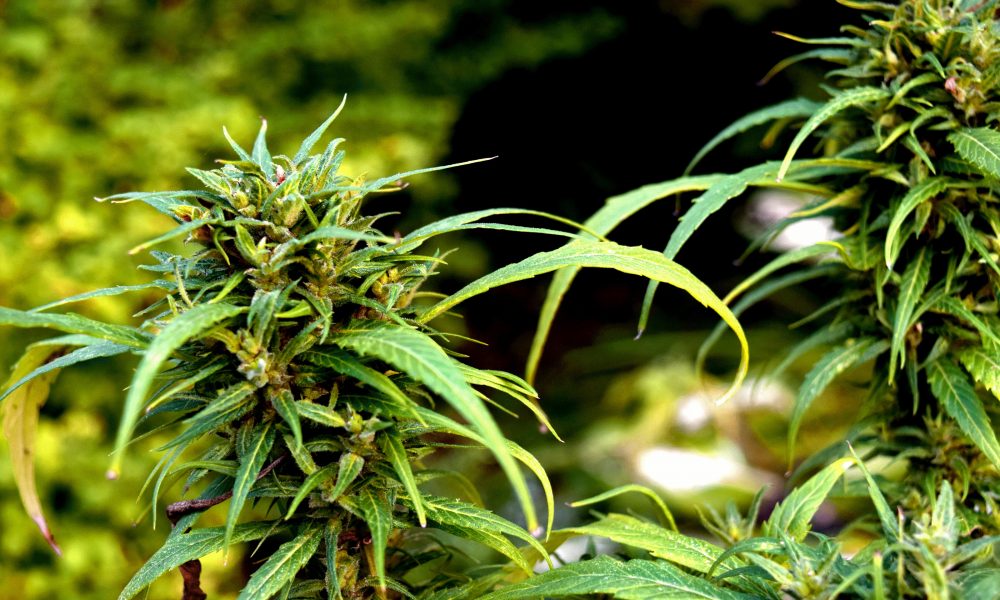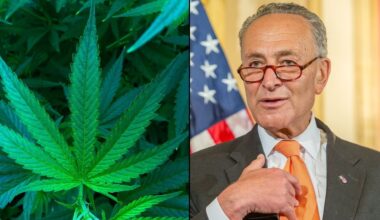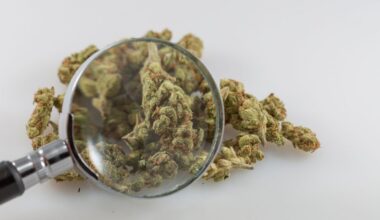The Mississippi House of Representatives passed an amended medical marijuana legalization bill on Wednesday on a 104–14 vote, making changes aimed at addressing concerns raised by Gov. Tate Reeves (R). If the Senate approves the changes and the Reeves indeed signs the bill, a system to regulate and sell cannabis to registered patients could launch later this year.
Mississippi’s full Senate passed a version of the legalization measure last week, rejecting amendments from liberals and conservatives alike. And although the governor has remained skeptical of the bill—threatening a veto of a draft version circulated late last year—he said earlier this week that it’s getting “better” with every revision.
Rep. Lee Yancey (R), who chairs the House Drug Policy Committee, and who’s been working with the bill’s lead sponsor, Sen. Kevin Blackwell (R), said before the the House floor vote that he never imagined he’d be in the position to legalize cannabis. But he said a voter-passed legalization initiative in 2020 showed strong support for compassionate use.
Since then, proponents in the legislature have worked to balance the earlier initiative’s proposals against demands from the governor and other critics for tighter restrictions.
“When I got involved in this bill, I said, ‘How can we build a wall around this program so the people who get it are the people who need it the most, and only the people who need it the most?” Yancey said. “This is not for everybody out on the street. This is not for a bunch of kids. This is for hurting people with debilitating conditions.”
The legislation as passed by the House would allow patients with about two dozen qualifying medical conditions to purchase the equivalent of 3.5 grams of marijuana (or 1 gram of cannabis concentrate) per day, with a maximum monthly limit of 3 ounces. An amendment reduced the maximum monthly amount down from the 3.5-ounce limit passed by the Senate.
Another amendment, attached to the bill by the House Drug Policy Committee earlier on Wednesday, would remove the state Department of Agriculture and Commerce from oversight of the industry, instead handing that role to the Department of Health. Agriculture and Commerce Commissioner Andy Gipson (R) said last year that his department should have no role in regulating medical marijuana so long as cannabis remains federally illegal, although he said earlier this week that he was preparing to take on the job if directed by lawmakers.
There would be no limit on the number of licensed businesses under the plan, although local governments could impose zoning restrictions and even opt out of the law entirely within 90 days—a move that voters could later challenge.
Under another House amendment, cannabis cultivators and processors, which under the Senate bill could only be located in areas zoned for agricultural and industrial use, could also locate in commercial-zoned areas.
—
Marijuana Moment is already tracking more than 1,000 cannabis, psychedelics and drug policy bills in state legislatures and Congress this year. Patreon supporters pledging at least $25/month get access to our interactive maps, charts and hearing calendar so they don’t miss any developments.![]()
Learn more about our marijuana bill tracker and become a supporter on Patreon to get access.
—
Mississippi voters decisively approved a broad legalization initiative in November 2020. The state Supreme Court overturned the measure on procedural grounds last May—simultaneously doing away with the state’s entire initiative process—and lawmakers have spent the last several months navigating what comes next.
The current bill, SB 2095, draws heavily from provisions negotiated by lawmakers in the second half of last year, as legislative leaders prepared a bill for an anticipated special session last summer that the governor never called. Supporters say the lengthy proposal represents a middle ground between the more permissive plan approved by voters and the narrower approach preferred by Reeves and some lawmakers.
Despite the governor’s past opposition to medical marijuana bills, Reeves indicated this week that he’s warming to the current proposal as the result of changes since last fall.
“I heard Sen. Blackwell say the other day on the floor that this is the 46th version,” he said Tuesday on a SuperTalk Mississippi morning radio show. “And the good news is, as each version is written, the bill gets better.”
Specifically, he pointed to provisions in the current bill that reduce purchase limits from past amounts, allow law enforcement to perform background checks on would-be business owners and impose restrictions such as mandatory parental consent for patients under 18 and required recommendations from two healthcare practitioners for patients between 18 and 25.
Reeves said he was still holding out hope that House Speaker Philip Gunn (R) would oversee further changes to the Senate-passed bill, which may account for some the House changes adopted Wednesday.
“I’m hopeful that the leadership in the House will take this bill, recognize that as each version has come out, it’s gotten better—it’s gotten closer to medical marijuana,” the governor said, “and I’m hopeful that the House will take the next step to do just that and send a better bill back to the Senate.”
The bill needs a three-fifths supermajority support in both chambers to make its way to Reeves’s desk.
Qualifying conditions under the bill include cancer, Parkinson’s, Huntington’s, muscular dystrophy, glaucoma, spastic quadriplegia, HIV, AIDS, hepatitis, Alzheimer’s, sickle-cell anemia, Crohn’s, ulcerative colitis, neuropathy, spinal cord disease or severe injury as well as chronic medical conditions or treatments that produce severe nausea, cachexia or wasting, seizures, severe or persistent muscle spasms or chronic pain.
Further conditions could be added later by regulators via petition. State-issued patient registration cards would cost $25, though some people could qualify for a lower price.
Registered patients would be subject to purchase limits that would restrict them to no more than one “medical cannabis equivalency unit” per day, which the bill defines as 3.5 grams of cannabis flower, one gram of concentrate or up to 100 milligrams of THC in infused products. While those limits are significantly lower than in most states where cannabis is legal for medical patients, Gov. Reeves said last year the program should allow only half those amounts.
The bill does include slightly lower total monthly limits for patients, reducing what had been four ounces per month in a draft version of the legislation last year down to 3 ounces in the House-passed measure. The Senate version, by comparison, allows a total of 3.5 ounces per month.
Patients or caretakers would be forbidden from growing their own cannabis under the proposal. Products from state-licensed companies, meanwhile, would be limited to 30 percent THC for cannabis flower and 60 percent for concentrates. Medical marijuana would be taxed at a wholesale rate of 5 percent, and purchases would also be subject to state sales tax.
Smoking and vaping cannabis would be illegal for patients in public and in motor vehicles, and it would still be a crime patients to drive under the influence.
The legislation would task the Mississippi Department of Health to oversee the new industry. It would also establish a nine-member advisory committee to advise on issues such as patient access and industry safety.
Licensing of cannabis businesses other than dispensaries—including cultivators, processors, transporters, disposal entities, testing labs and research facilities—would begin 120 days after the bill’s passage, with the first licenses issued about a month after that. The dispensary licensing process would kick off 150 days after passage, with the first licenses coming a month later. That would mean the program could be up and running, at least in limited form, by the end of this year.
Cannabis businesses may have to get seek local approval to operate, and municipalities can adopt zoning and land use restrictions. In general, local governments could not ban medical cannabis businesses outright or “make their operation impracticable,” the bill says, but a separate provision would allow local governments to opt out of the program altogether within 90 days of the bill’s passage. In such cases, citizens could then petition to put the question to a vote.
Among the amendments the House rejected on the floor Wednesday was a proposal by Rep. Robert L. Johnson III (D) to expedited expungements of criminal convictions for cannabis activity no longer criminalized under the bill. Representatives voted the change down on a voice vote after Yancey said it would be better left to separate legislation. Sen. Derrick Simmons (D) raised a similar amendment on the Senate side last week, but it was also rejected.
Rep. Dana Criswell (R) introduced an amendment to specify that excise taxes would be capped at 5 percent, with regulators required to review the taxes after the program’s first fiscal year and recommend whether the rate should be adjusted to effectively cover only the costs of the program.
A rejected amendment from Rep. Dan Eubanks (R), meanwhile, would have extended the bill’s ban on lawmakers having an interest in cannabis businesses to a period of four years. The current legislation bans lawmaker participation until this December. Another amendment from Eubanks voted down by colleagues would have eliminated the excise tax on cannabis in the case of federal legalization.
Rep. Omeria Scott (D) brought a number of amendments that were voted down, including changes that would adjust the composition of the state’s medical marijuana advisory board, allowed outdoor cultivation and mandated that reports about the program be publicly posted.
On the Senate side last week, sponsor Blackwell successfully fought to deny several amendments to the legislation, some of which were again introduced and subsequently shot down on the chamber floor. Those changes also included proposals to allow outdoor cultivation and express the state’s intent to advance the interests of underserved communities.
For much of last year, it appeared lawmakers were set to pass a medical marijuana bill during a special legislative session, but the governor ultimately decided against calling the special session after reaching an impasse with lawmakers. Those who supported legalization said at the time that responsibility for the failure rested with Reeves.
“We have worked long hours on this,” Yancey said in October. “We are ready to have a special session. We have the votes to pass this. An overwhelming number in the House and Senate are ready to pass this, and we have a majority of people in Mississippi who voted for us to pass this… If there is any further delay, that will be squarely on the shoulders of the governor, rather than the Legislature.”
Later that month, Reeves dodged questions from patient advocates about why he’d failed to call the special session. Then in late December, he said on social media that he had “repeatedly told the members of the Legislature that I am willing to sign a bill that is truly medical marijuana,” but stressed that there should be “reasonable restrictions.”
“There is one remaining point in question that is VERY important: how much marijuana any one individual can get in any given day,” he wrote, doing back-of-the-envelope math to argue that the system would lead to “1.2 billion legal joints.”
While Reeves said he would consider rejecting the bill over possession limits, Sen. Brice Wiggins (R), chairman of the Judiciary Committee Division A, said it wouldn’t surprise him if the legislature were to override the governor if he chooses to veto the bill.
“I would hate for Governor Reeves to have any veto overridden because, like I said, I’ve worked with him on many different things,” Wiggins said late last month. “But the reality is is that Initiative 65 passed with close to 70 percent of the vote. And the legislature spent all summer working on this and have listened to the people.”
Senator Jeff Tate of Clark andLauderdale counties was one of several lawmakers to attempt to smell the product pic.twitter.com/iJ9KbJAEm8
— Kobee Vance (@kobeevance) January 13, 2022
Sen. Blackwell tried to make a point to the governor about purchase limits when he brought hemp to Reeves’s office earlier this month to give an idea of the amounts allowed under the bill. “I took samples to show him what an ounce actually looks like—what 3.5 grams actually looks like,” the bill’s sponsor said.
Blackwell repeated the stunt on the Senate floor last week, bringing a joint and plastic bags—one containing the daily limit of 3.5 grams, and another containing a full ounce of hemp. Some colleagues also opened the baggies to smell the samples.
A poll released in June found that a majority of Mississippi voters support legalizing marijuana for both medical and recreational use, with 63 percent saying they want the legislature to pass a bill that mirrors the ballot measure that was nullified by the Supreme Court.
Federal Probe Into Missouri Medical Marijuana Licensing May Be Ongoing, Court Documents Suggest
Photo by Sam Doucette on Unsplash
Medical Disclaimer:
The information provided in these blog posts is intended for general informational and educational purposes only. It is not a substitute for professional medical advice, diagnosis, or treatment. Always seek the advice of your physician or other qualified healthcare provider with any questions you may have regarding a medical condition. The use of any information provided in these blog posts is solely at your own risk. The authors and the website do not recommend or endorse any specific products, treatments, or procedures mentioned. Reliance on any information in these blog posts is solely at your own discretion.







